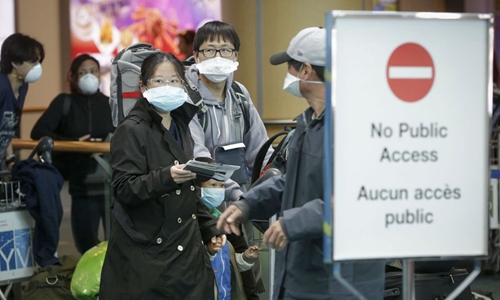HOME >> CHINA
Mixed feelings toward overseas Chinese returning to escape COVID-19
By Wang Qi and Leng Shumei Source:Global Times Published: 2020/3/18 18:59:29

Travellers wearing face masks are seen at Vancouver International Airport in Richmond, Canada, March 16, 2020. (Photo by Liang Sen/Xinhua)
There have been mixed opinions online about the growing number of Chinese, especially students, returning to China from abroad amid the worsening coronavirus crisis in many countries.
Many Chinese people show understanding and support for the country's increasingly strict regulations on those returning. While welcoming overseas Chinese home, their decision to return has created bad feelings, especially with the growing number of imported infection cases China has recorded.
A video clip showing a Chinese student who had returned from the US refusing to take a throat swab test and report her temperature went viral recently, with many netizens condemning her as irresponsible.
Some reports say she slammed the door of state-provided isolation room and even insulted staff. Although she stressed that she was not sick, her health condition remains unknown.
One man who returned from Italy is also in hot water after complaining about the long waiting line, saying, "That's how I was treated?" Some reports say he even pushed and shoved staff to vent his discontent.
Many net users have started using the term "giant babies" to describe the immature and selfish mindset of some adults who take nationwide efforts to contain the coronavirus for granted. Many even called for an investigation and legal consequences.
Bayer China fired an employee who breached quarantine rules by taking a jog outside without wearing a mask while she was supposed to be on a 14-day mandatory isolation. The female Chinese-Australian also argued loudly with a Beijing community worker, yelling that she was being harassed.
Excluding those seeking treatment back home, analysts believes that a long, bumpy journey in a confined public space increases the risk of infection. So for healthy people, going back to China is not recommended.
Nevertheless, the Chinese government has built a new defensive line to contain imported cases and protect the safety of Chinese, including a 14-day isolation in designated spots, punishing acts of obstructing border health checkups, including concealing health status, and reopening Xiaotangshang hospital, Beijing's SARS hospital, to screen international visitors and returned nationals.
"The joint efforts should not be wasted. Actually, I am not that welcoming of those guys who are selfish, arrogant and even those with the virus coming back to China," said a typical netizen on Sina Weibo, who is worried about imported cases and feels uncomfortable about the bad examples set by returning Chinese.
China has reported at least 155 imported cases as of Tuesday.
"Our term was suspended despite online courses… my family worries about me as the French government cannot provide the same protection as us," a Chinese student surnamed Ma who returned to Shanghai from Paris on Sunday told the Global Times.
Ma said that airport staff are stressed and even short-handed sometimes due to the large number of overseas returnees. He calls for mutual understanding between people and asks passengers to prepare their documents and personal information for checkup procedures in advance to shorten waiting times.
"We are not scientists returning home with honors, we are refugees seeking help from our homeland," Ma said, "The staff are also ordinary people, they work very hard. They are serving society, not specific individuals."
Yin Hongbiao, a retired professor from the School of International Studies at Peking University, called for a rational attitude toward returning overseas Chinese, despite reports of several negative cases.
"Overseas Chinese have provided huge help to the motherland since the onset of the epidemic. Their contribution should not be written off by negative comments," Yin told the Global Times on Wednesday.
He called on governments and social public welfare organizations to establish special funds to help returning Chinese who have financial difficulties paying quarantine and treatment fees, which is reportedly a large sum.
The Global Times found that it cost 300-500 yuan ($71) per room per day in quarantine. The cost is much higher for treatment. A Wuhan doctor named Yang Qingfeng posted a screenshot of a critical patient's bill on Weibo, showing costs coming to nearly 1.13 million yuan.
Policies concerning returning Chinese vary in different cities in China. For example, Beijing authorities regulated that those who were infected overseas but have contributed to domestic social security can receive treatment for free, but others should pay for themselves. Those requiring quarantine in designated centers should also bear the costs themselves.
Beijing authorities said that they would provide medical assistance to those confirmed to have financial difficulties according to law.
Posted in: SOCIETY